Suchergebnisse
Digitales Planen, Bauen und Betreiben
Das Planen, Bauen und Betreiben von Gebäuden und Quartieren wird künftig wesentlich durch den digitalen Wandel bestimmt werden, welcher immenses Potenzial zur Verbesserung von Energie- und Ressourceneffizienz bietet. Digitale Technologien und Anwendungen schaffen die Möglichkeit, den Baulebenszyklus hinsichtlich Kosten, Terminen, Qualität und Planungssicherheit zu optimieren und damit Risiken zu minimieren.
Green SandboxBuilder - Regulatory Sandboxes im Bereich des nachhaltigen Bauen und Sanierens
Im Projekt "Green SandboxBuilder" wurde erstmals in Österreich der Bedarf an Regulatory Sandboxes für ökologisch nachhaltige und klimawirksame Vorhaben im Baubereich systematisch erhoben. Die Umsetzung von Regulatory Sandboxes im österreichischen Bausektor kann dazu beitragen, die Einführung von technologischen, prozessualen und sozialen Innovationen entscheidend zu beschleunigen und somit die Nachhaltigkeitsziele zu erreichen.
Green SandboxBuilder - Regulatory sandboxes in the field of sustainable construction and renovation
In the "Green SandboxBuilder" project, for the first time in Austria, the need for regulatory sandboxes for ecologically sustainable and climate-effective projects in the building sector had been systematically explored. The implementation of regulatory sandboxes in the Austrian construction sector can contribute to decisively accelerating the introduction of technological, procedural and social innovations and thus to achieving the sustainability goals.
DigitalFindetStadt - Plattform für digitale Innovationen der Bau- und Immobilienwirtschaft
"Digital Findet Stadt" stärkt die digitale Innovationskraft der österreichischen Bau- und Immobilienwirtschaft und trägt damit zu einer wesentlichen Steigerung der Ressourcen-, Energie- und Kosteneffizienz bei.
DigitalFindetStadt - Platform for digital innovations in the building sector
"Digital Findet Stadt" strengthens the digital innovation power of the Austrian building sector and thus contributes to a significant increase in resource, energy and cost efficiency.
Digital Submission - Aufbereitung von Planungs- und Entscheidungsprozessen, Digitalisierung von Baubewilligungsverfahren (D-SUB)
Ziel des Projektes war es, die Grundlagen für die Implementierung von digitalen Ablaufprozessen für Baubewilligungsverfahren in der Steiermark zu erarbeiten und zu evaluieren. Grundbaustein war die Erfassung, Aufbereitung und Validierung der IST-Prozesse von Baubewilligungsverfahren am Beispiel der Stadt Graz und der Gemeinde Stainach-Pürgg.
Digital Submission - Preparation of planning and decision-making processes, digitisation of building permit procedures (D-SUB)
The aim of this project was to develop and evaluate the foundation for the implementation of digital processes for building permit procedures in Styria. The project started with the recording, processing, and validation of the actual processes of building permit procedures of the city of Graz and the municipality of Stainach-Pürgg.
Documentation, comparison and processing of demonstration results on the topic of "Digital Building Twin"
The aim of the project was to compare results from two demonstration projects of a digital building twin and to document initial operational experiences.
BIMSavesEnergy - BIM-basierte Planungsmethoden zur Sicherstellung von Energie-effizienz im Bauprozess
Das Building Information Model (BIM) bewirkt grundlegende Veränderungen in Planung und Bau von Gebäuden, da durch die gemeinsame Datenbasis erstmals eine enge, organisationsübergreifende Zusammenarbeit in Bauprojekten möglich wird. In diesem Projekt wurden BIM-basierte Planungsmethoden entwickelt, die den Einfluss von Planungsentscheidungen auf die Energieeffizienz quantitativ bewertbar und im Managementprozess steuerbar machen.
Housing 4.0 - digital platform for affordable living
The main aim of this project is the development of an integrated framework for the digital platform "Housing 4.0"; thus supporting integrated planning and project delivery through coupling various digital tools and databases. Thereby, the potentials of BIM for modular, off-site housing assembly in order to improve planning and construction processes, reduce cost and construction time and allow for mass customization will be explored. The novel approach in this project is user-involvement; which has been neglected in recent national and international projects on off-site, modular construction, supported by digital technologies.
WOHNEN 4.0 - Digitale Plattform für leistbares Wohnen
Im vorliegenden Forschungsvorhaben wurde das Rahmenwerk für die digitale Plattform "Wohnen 4.0" entwickelt, welche durch eine Parameter-Datenbank und Koppelung digitaler Werkzeuge die integrale Projektabwicklung unterstützt. Der Fokus lag dabei auf der Entwicklung und Nutzung von BIM-Objektbibliotheken für die modulare Off-Site Produktion im Geschoßwohnbau. Erstmalig wurden auch Nutzer:innen beteiligt und dadurch der zunehmend wichtiger werdende Aspekt der Partizipation integriert.
Energiemosaik Austria - Österreichweite Modellierung und webbasierte Visualisierung von Energieverbrauch und CO2-Emissionen auf Gemeindeebene
Inhalt des Projektes ist eine alle Nutzungs- und Mobilitätsarten umfassende Modellierung und webbasierte Visualisierung von Energieverbrauch und Treibhausgasemissionen aller österreichischen Gemeinden. Die Ergebnisse können in zahlreiche energie- und klimarelevante Handlungsfelder integriert und für die Sensibilisierung von Entscheidungsträgern und Öffentlichkeit genutzt werden.
Digital technologies
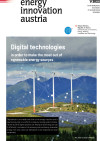
Digital technologies in order to make the most out of renewable energy sources.
energy innovation austria
1/2022
Herausgeber: BMK in cooperation with the Climate and Energy Fund
Englisch, 12 Seiten
Downloads zur Publikation
Digitization in the construction and real estate industry
In the multitude of digital possibilities, it is very difficult to maintain an overview, to assess trends and potentials, and to recognize correlations. This report therefore aims to describe the current state of the art and the market assessment of promising digital technologies. Information is provided on concrete use cases, added value and challenges of the respective technologies. The analyses presented serve to assess the potential and set the strategic course for the integration of the currently most important digital technologies in the construction and real estate industry.
Digital transformation of the Austrian construction industry and its impact on employment
What are the impacts of the digital transformation of the Austrian construction industry on this sector’s labour market? By looking at the next five to ten years it will be analysed whether and to what extent digital applications lead to an increasing, falling or stagnant demand for employees in the construction industry and in construction occupations.
M-DAB2: Materialintensität der Innenentwicklung - Ressourcenbewertung und Lokalisierung städtischer Entwicklungspotenziale
Bei der Bewertung von Innenentwicklungspotenzialen wurde erstmals auch die Materialintensität der Innenentwicklung (anfallende Stoffmengen) für unterschiedliche Entwicklungsvarianten berücksichtigt. Dabei wurde ein Methodenset zur holistischen Bewertung von Potenzialflächen und verschiedene Entwicklungsvarianten und -szenarien zur ressourcenschonenden Innenentwicklung geschaffen.
Energiemosaik Austria - Österreichweite Modellierung und webbasierte Visualisierung von Energieverbrauch und CO2-Emissionen auf Gemeindeebene
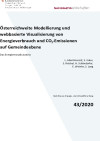
Inhalt des Projektes ist eine alle Nutzungs- und Mobilitätsarten umfassende Modellierung und webbasierte Visualisierung von Energieverbrauch und Treibhausgasemissionen aller österreichischen Gemeinden. Die Ergebnisse können in zahlreiche energie- und klimarelevante Handlungsfelder integriert und für die Sensibilisierung von Entscheidungsträgern und Öffentlichkeit genutzt werden.
Schriftenreihe
43/2020
L. Abart-Heriszt, S. Erker, S. Reichel, H. Schöndorfer, E. Weinke, S. Lang
Herausgeber: BMK
Deutsch, 56 Seiten
Downloads zur Publikation
Dokumentation, Vergleich und Aufbereitung von Demonstrationsergebnissen zum Thema „Digitaler Gebäude Zwilling“
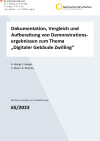
Ziel des Projekts war es, Ergebnisse aus zwei Demonstrationsvorhaben eines digitalen Gebäudezwillings miteinander zu vergleichen und erste Betriebserfahrungen zu dokumentieren.
Schriftenreihe
65/2023
D. Jähnig, F. Hengel, C. Moser, R. Pertschy
Herausgeber: BMK
Deutsch, 23 Seiten
Downloads zur Publikation
Technologiereport: Digitalisierung der Bau- und Immobilienbranche
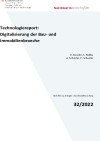
In der Vielzahl digitaler Möglichkeiten ist es nur sehr schwer möglich, einen Überblick zu behalten, Trends und Potentiale abzuschätzen sowie Zusammenhänge zu erkennen. Der vorliegende Report zielt daher darauf ab, den aktuellen Stand der Technik und die Markteinschätzung vielversprechender digitaler Technologien zu beschreiben. Es werden Informationen über konkrete Anwendungsfälle, Mehrwert und Herausforderungen der jeweiligen Technologien bereitgestellt. Die dargestellten Analysen dienen der Potentialbewertung und der strategischen Weichenstellung zur Integration der aktuell wichtigsten digitalen Technologien der Bau- und Immobilienbranche.
Schriftenreihe
32/2022
K. Künzler, S. Robbi, A. Schuster, P. Schuster
Herausgeber: BMK
Deutsch, 92 Seiten
Downloads zur Publikation
Green SandboxBuilder: Regulatory Sandboxes im Bereich des nachhaltigen Bauens und Sanierens
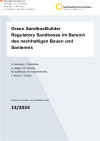
Im Projekt "Green SandboxBuilder" wurde erstmals in Österreich der Bedarf an Regulatory Sandboxes für ökologisch nachhaltige und klimawirksame Vorhaben im Baubereich systematisch erhoben. Die Umsetzung von Regulatory Sandboxes im österreichischen Bausektor kann dazu beitragen, die Einführung von technologischen, prozessualen und sozialen Innovationen entscheidend zu beschleunigen und somit die Nachhaltigkeitsziele zu erreichen.
Schriftenreihe
13/2024
G. Leimüller, J. Rohrhofer, A. Gerger, Ch. Schranz, M. Aichholzer, M. Schachenhofer, C. Benes, F. Ozclon
Herausgeber: BMK
Deutsch, 71 Seiten
